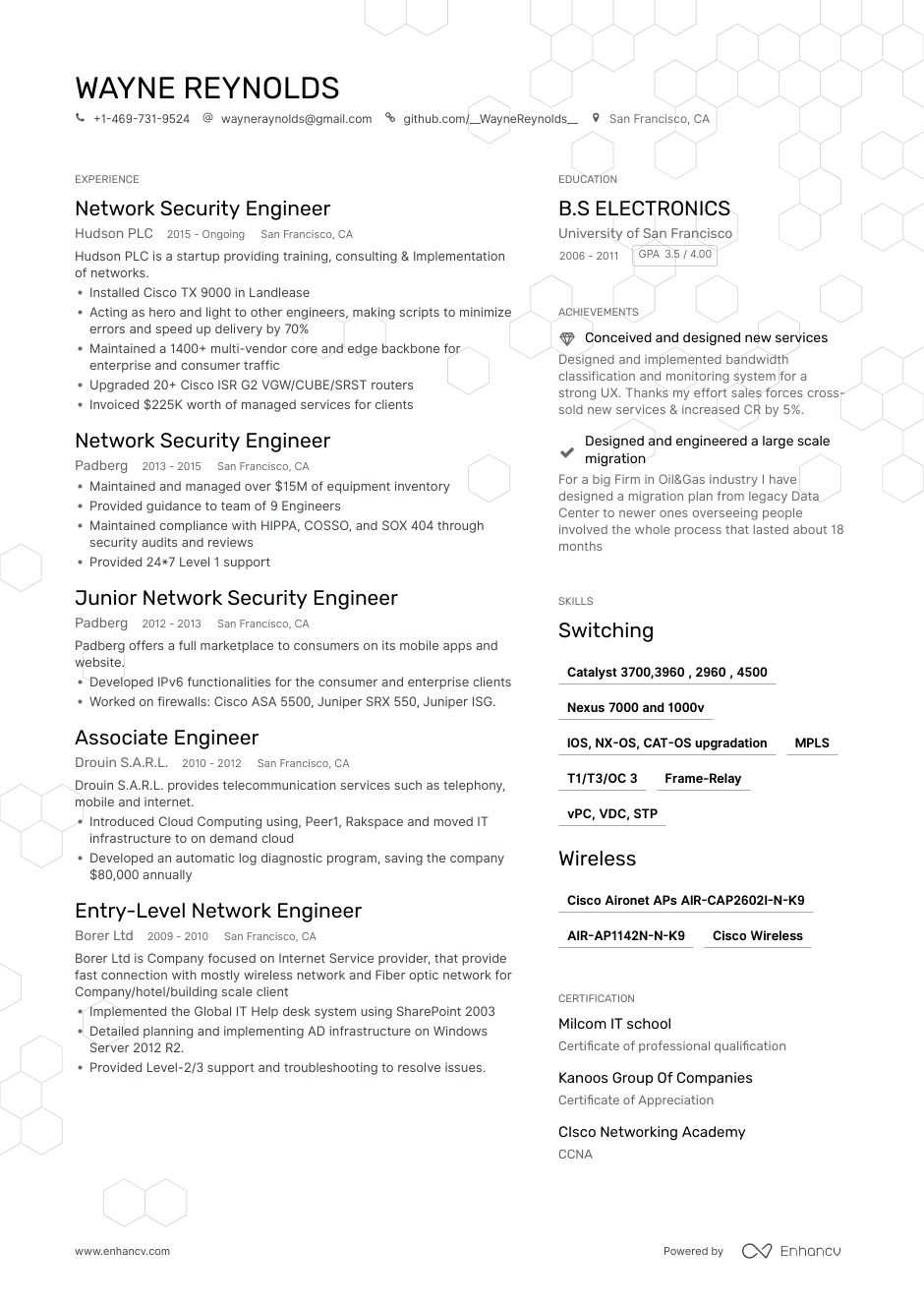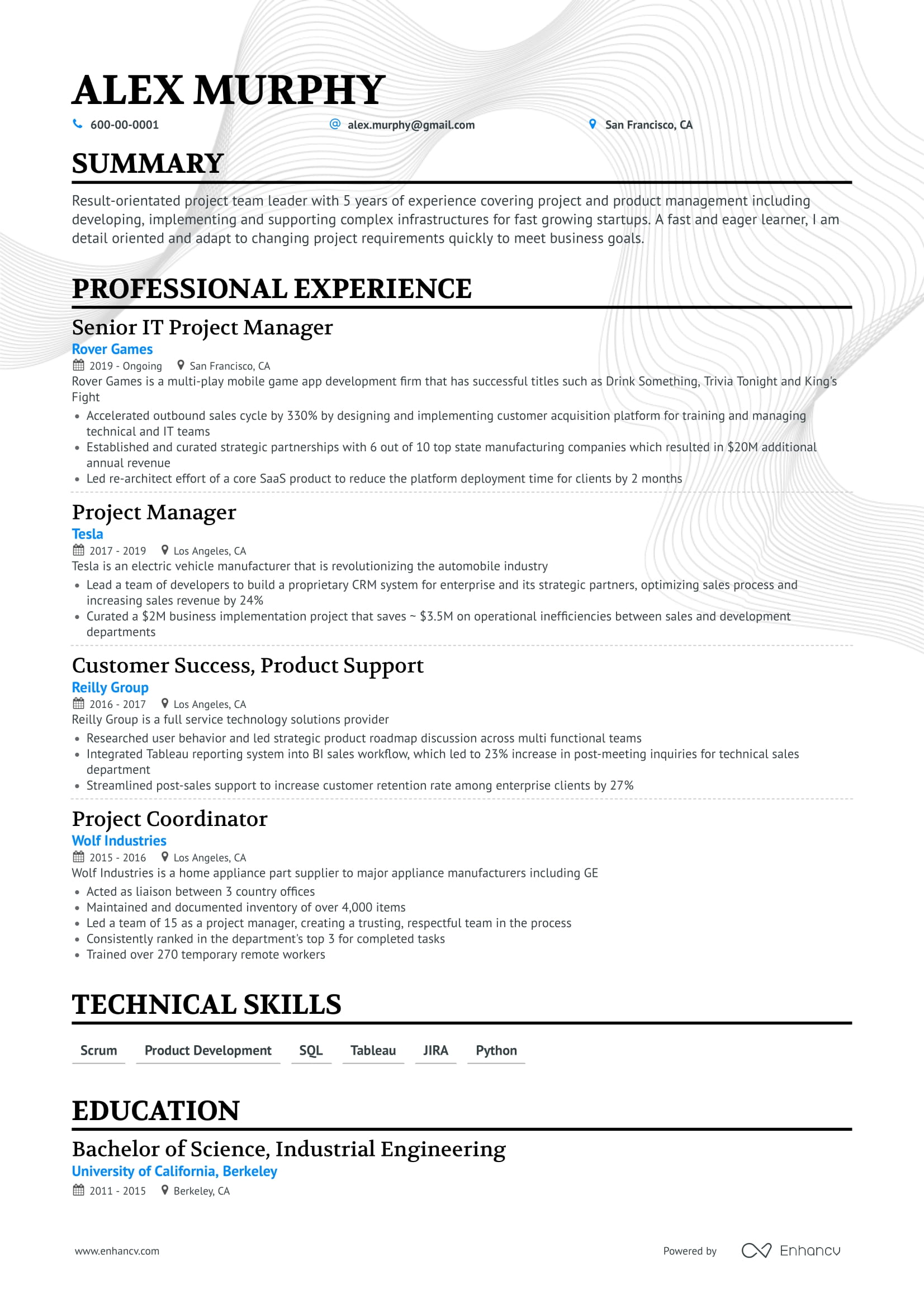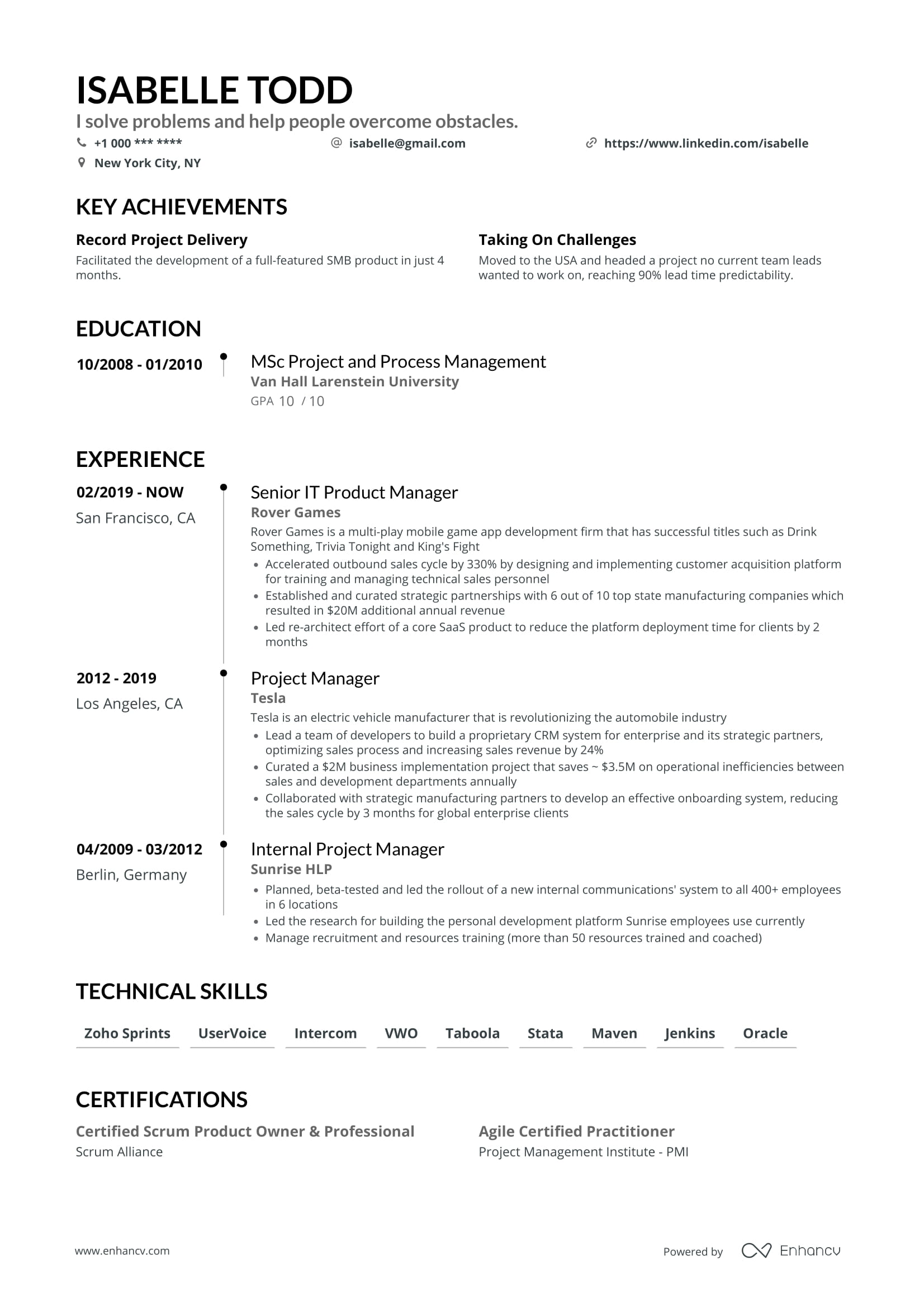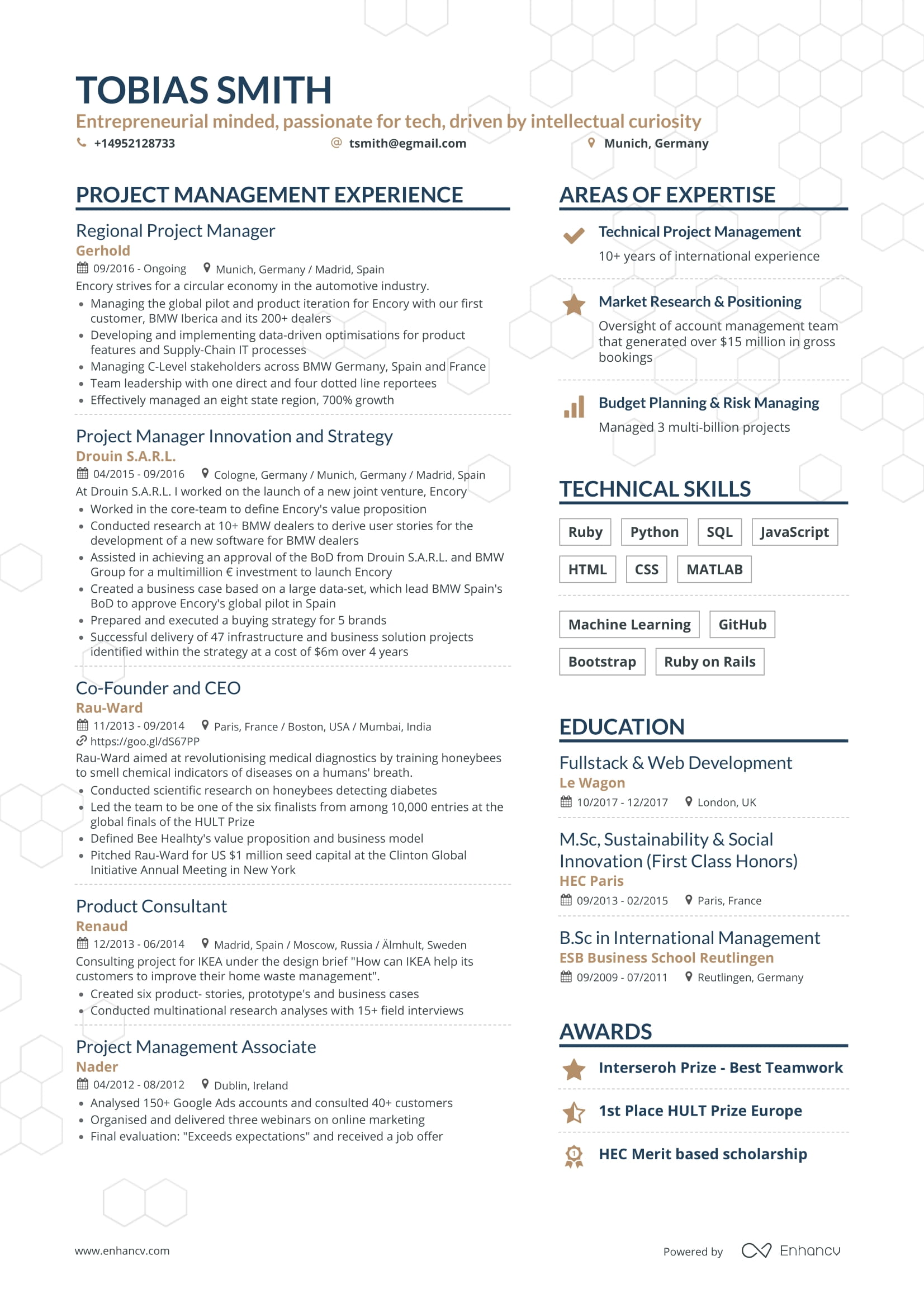Example Network Security Engineer Resume - Browse more resume templates and build a stand-out resume
As a Network Security Engineer, you’re the unsung hero of your company’s IT department.
You stand between your company and the increasing threat of cyber attacks, data breaches, ransomware, and corporate espionage.
The demand for highly skilled Network Security Experts is big, but so are the requirements.
Your Network Security Engineer resume must display experience in computer science, networking, and information security.
- Can you set up and configure routers and switches in your sleep?
- Do you juggle HTTP, TSL, IPsec protocols with ease?
- Are you one step ahead of attackers? Know how to use Stealth Watch?
Well, you need to prove all of that and more with your Security Engineer resume.
If you want to strike a chord with your recruiter stick with us for the following sections.
We’ll help you craft a striking resume and land your next interview faster than you can say Cisco Certified Network Professional.
Talking points from our Network Security Engineer resume guide
- Review 9 Network Security Engineer resume samples and their high and low points.
- How to keep your Network Security Engineer resume brief, focused and concise.
- How to use your header, summary and work experience to produce an impact.
- What skills and technology proficiency IT managers look for.
- Which certifications will give you an edge over competing Network Security Engineers.
See below Network Security Engineer resume example
Check out other related resumes by Enhancv
How should you write a Network Security Engineer resume that lands jobs
There is a staggering amount of technologies working together to ensure a network and the data it transmits are protected.
Your networking skills stand at the top of the list - setting up servers, managing routers and switches, implementing TCP/IP protocols, etc.
Include any of the following network security proficiencies in your resume:
- Access control
- Antivirus and antimalware software
- Data loss prevention
- Email security
- Firewalls
- SIEM - Security information and event management
- Web, Wireless and Mobile security
Each is important, but what does the job description say?
If the employer is using predominantly Cisco networking hardware and software, that must be the most prominent section in your Security Engineer resume.
Make sure you list your proficiency with Cisco security technology like:
- Cisco ASA
- Meraki MX
- Firepower
That said, your experience with Palo Alto Cortex or FireEye solutions is also important. More often than not you will need to mix and match different technologies and vendors when managing the security of a given network.
Focus on how you used these security products to improve the efficiency and reliability of the entire network.
- Did you reduce network delays from security systems by 13%?
- Cut down security monitoring time by automating parts of the system?
- How did you solve vulnerabilities in 3rd party software used by the company?
Your technical skills are indispensable. However, you will frequently collaborate with other departments. Soft skills like communication, organization and teamwork are sought for.
That’s a lot of information to squeeze into your Network Security Engineer resume. It’s essential that you start with an effective resume layout.
What’s the proper Network Security Engineer resume format?
There are three common layouts found in every resume out there:
- Reverse chronological - this layout focuses on work experience and education in a timeline format.
- Functional - this layout displays your skills and competencies up top, focusing on your abilities instead of past experience.
- Hybrid- this layout is a mix of the two other, making sure all skills and experience relevant to the job offer are positioned at the top.
For a Network Security Engineer resume, the hybrid layout is recommended, as it provides a quick rundown of your professional abilities, coupled with experience.
Employers are interested in candidates who understand how their network works and can implement effective security measures.
Regardless of which layout you choose, there are several sections you must absolutely include in your network security resume.
Here’s what employers want to see in a Network Security Engineer resume
- The resume header must clearly state who you are and what you do
- A good resume summary grabs the attention and keeps the recruiter reading
- Convincing technical and soft skills help dial you in as the right applicant
- Work experience creates an impact and brings your value proposition up front
- Industry accepted certification and education is essential to get the job
Here’s how to write a Network Security Engineer resume header
The resume header is often taken for granted. There are just so many ways you can write your name and phone number right?
Wrong.
In fact, most Network Security Engineers don’t use the full potential of the header section. Let's review the following resume samples and see how we can improve yours.
2 Network Security Engineer resume header examples
Okay, what are the differences:
- The second resume example includes way more information about the applicant.
- The job title is very descriptive and gives a sense of the applicant’s skills early on.
- There is a GitHub portfolio linked in the second example. GitHub is the go-to community for all IT professionals, regardless if they are programmers or not.
A recruiter will scan your resume for keywords related to the job. Adding the required networking technologies, as found in the specific job offer, at the top of your resume will keep them reading.
The best way to make your Network Security Engineer summary (examples included)
So far, so good, they are reading your Network Security Engineer professional summary.
This is the make or break section in your entire resume. If you don’t make an impact now, you’re headed for the bin.
Construct your resume summary around your experience with the technologies and responsibilities listed in the job description.
- Which networking systems are they working with - Cisco, Azure, Aruba?
- Is the position calling for an all-around cybersecurity expert or, say, a specialist in email security to join a team of Network Security Engineers?
Your cyber security resume objective should be specific and portrait you as the perfect candidate for the job.
2 Network Security Resume summary examples
The summary above is far too vague. The only piece of information provided if the size of the network.
There is no mention of the security system installed, the networking technology used or the type of threats and vulnerabilities which the engineer had to resolve on a daily basis.
This summary is a bit better. It mentions the years of experience and the technology this candidate is proficient in, as well as the scale of the network he was working on.
It could still be made better by eliminating the use of “ I “ and including more specific information about skills and certifications.
Now, this is a great Network Security Engineer summary. It lists the applicant’s experience, their CCNP certification, knowledge of various security technologies and networking hardware.
Last but not least, it mentions the industry they worked with. Financial companies are magnets for hackers. If you’re able to successfully defend a cryptocurrency startup’s servers, you have something to brag about.
What should your Network Security resume experience section look like?
If a recruiter is reading the experience section on your Network Security Engineer resume, you’ve likely passed at least one round of sorting.
The worst thing you can do now is type out a generic job description and bore them to death.
Yes, you are expected to have managed computer networks and implemented antivirus software, firewalls, encryption protocols etc.
- But which ones? At what scale?
- What challenges you’ve encountered?
- What unique solutions you have created?
- What results do you have to show for yourself?
You must be specific!
Look at the job description and extract network security technologies and skills the employer is looking for. Tailor your work experience around them to make yourself more relevant to the recruiter.
Add more skills and proficiencies to fill in the gaps.
Don’t forget about the soft skills. You will be communicating and collaborating with other departments, so you must be a problem solver, team player and good organizer.
Let’s analyze some real-world work experience samples.
Network Security Engineer resume experience examples
This work experience description is bland and vague. It’s nothing more than a boring description of what a network security engineer does.
It’s true, however, it doesn’t provide any specific information about the job.
- Was type of network - Cisco, HPE, Juniper?
- What security software and protocols were implemented?
- Which vulnerabilities were solved and how?
This work experience is much better. The applicant speaks of specific hardware and software technologies they used on a daily basis and the responsibilities they had.
If the hiring company works predominantly with Cisco products, this candidate has super relevant work experience already.
That said, it can be even better. Let’s look at a few more cyber security resume examples.
Cyber Security Engineer resume experience examples
Again, this work experience is generic and doesn’t offer any insight about what was actually done during the project.
The applicant doesn’t demonstrate proficiency in any technology, hardware or software.
They may be an excellent cybersecurity expert, but their experience is poorly explained and such a resume may not reach an interview stage.
Let’s see how we can fix it in the next cyber security sample resume.
Now this is a well-crafted experience section. The applicant mentions several software products they used for penetration testing, giving a hint of what that vulnerabilities report looked like.
They state what improvements they implemented and how they improved the performance of the network - something which the employer will certainly want to know.
How to position skills on Network Security Engineer resume
Your technical skills are the alpha and omega when it comes to network security.
A Cybersecurity Engineer resume must prominently feature skills and proficiency related to networking, network security, data protection, access control and general IT / CS.
Most wanted network security engineer skills
- Networking hardware - routers, switches, hubs, bridges, etc.
- Networking product vendors - Cisco, Aruba, Azure, Juniper, etc.
- Networking technologies - VPN, VLAN, VoIP
- Network and internet related protocols - TCP/IP, UDP, IPSEC, HTTP, HTTPS
- Antivirus and anti-malware software
- Firewalls
- Intrusion detection and protection protocols
- Penetration and vulnerability testing - IDS / ISP
- Databases - MySQL / MSSQL
- Authentication and access control
- Ethical hacking
As a Network Security Engineer, you’re not expected to code and program all the time.
However, as with any IT profession, programming skills will make you much better at your job and more valuable for your organization.
Top programing languages for network security engineers
- C/C++
- Python
- SQL
- Java
- PHP
- Javascript
- HTML / CSS
Soft skills are important for network security engineers. You will have to demonstrate:
- Problem solving
- Creativity
- Analytical and critical thinking
- Organization
- Effective communication
- Team work
- Working under pressure
The space on your resume is already limited. You can integrate your soft skills into other descriptions like the summary and work experience.
How to include an education section to my resume?
Network security is a high-level IT profession. Recruiters are looking for balanced candidates with plenty of skills and experience.
A relevant university degree in Computer Science and Information Technology guarantees the candidate has a solid foundation for both their hard and soft skills.
Include your CS or IT education in the standard format.
- Level of degree - Bachelors, Masters, PhD
- Field
- Year of graduation
- Institution
The higher your level of education, the higher you can grow in your career.
In the academic world, Network Security Engineers can become researchers and scientists and develop advanced technologies like AI or quantum computing.
In the corporate world, Network Security Engineers can grow up to a Chief Information Security Officer (CISO), which is a C-level executive role.
Of course, formal education is not be all end all. With the correct certificate, you can still land a job.
These 10 certificates are must-haves for Network Security Engineer resumes
With jobs in IT branching out wildly certificates provide targeted and focused education in specific niches.
As one of the largest vendors of networking hardware and software products, Cisco has established its own certification program, providing education in computer network engineering and network security.
Cisco Network Security certificates
Other Network Security Engineer certificates to show off on resume
Final takeaways from writing a Network Security Engineer resume
- Build your Network Security Engineer resume around the keywords and technologies used in the job offer.
- Keep your sentences clear and focused on your skills and experience. Avoid unnecessary and distracting information.
- Use your resume summary to produce an impact and keep your recruiter reading.
- Be specific about your work experience - share details, technologies, solutions and results.
- Add a skill section with your best technical, soft skills and programming languages.
- Ensure all relevant education and certifications are listed.





